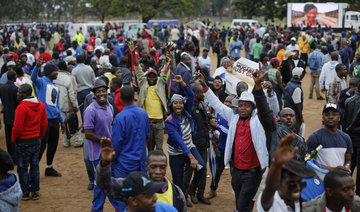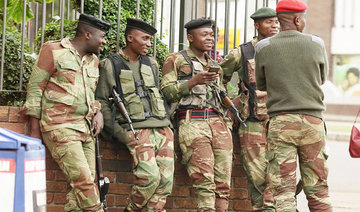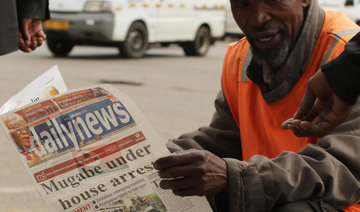HARARE: Tens of thousands of overjoyed protesters flooded Zimbabwe’s streets Saturday celebrating the crumbling of President Robert Mugabe’s ruthless regime, which had controlled the country for nearly 40 years.
In scenes of public euphoria not seen since independence in 1980, huge crowds marched, danced and sang their way through the capital Harare and other cities, demanding that Mugabe, 93, finally step down.
Following the mass demonstrations, sources in the ruling ZANU-PF party confirmed to AFP that they would hold a crisis summit on Sunday to discuss removing Mugabe as president and party leader.
The huge turnout came after an unprecedented week in which the military seized power and put Mugabe under house arrest in response to his sacking of vice president Emmerson Mnangagwa.
The marches were peaceful, despite a tense stand-off as heavily armed soldiers barred thousands of protesters from reaching Mugabe’s official residence, the State House, in central Harare.
'Best day of my life'
The crowd got within 200 meters (220 yards) of the gates to the complex that has been the nerve center of Mugabe’s authoritarian rule before staging a sit-down protest.
Saturday’s demonstrations, which began to draw down after 1530 GMT, were called by independence war veterans to thank the military, but soon spread to include citizens of all ages, jubilant that Mugabe appeared to be on his way out.
“This is the best day of my life. We are hoping for a new life after Mugabe,” said 38-year-old Sam Sechete at the main rally in Highfield, a working-class suburb of Harare.
A symbolic location, Highfield was where Mugabe gave his first speech after returning from exile in Mozambique ahead of independence in 1980.
Demonstrators, who began arriving around midnight, roared, whistled and chanted, brandishing placards proclaiming: “Not coup — but cool” and “Mugabe must go!“
In central Harare, a group of young men tore down a green metal street sign bearing Robert Mugabe’s name and smashed it repeatedly on the road before trampling it underfoot.
Other groups of protesters headed toward Mugabe’s private Blue Roof residence in the upscale suburb of Borrowdale, where he was initially held under house arrest following the army’s seizure of power.
Major General Sibusiso Moyo, whose faltering delivery of an army statement on state TV marked the completion of the take-over on Wednesday, told journalists at the protests “the people of Zimbabwe are disciplined, orderly and they are unified.”
In Bulawayo, the country’s second-largest city, demonstrators sounded car horns, whistled and blew vuvuzelas as they gathered outside City Hall.
'Violent suppression, economic collapse'
Such an open display of defiance would have been unthinkable just a week ago as dissent was routinely crushed by security forces.
But in a statement released on Friday, the army said it fully supported the protests.
The majority of Zimbabweans have only known life under Mugabe’s rule, which has been defined by violent suppression, economic collapse and international isolation.
“I went to university but here I am selling bananas to earn a living. If it wasn’t for Mugabe, I would be doing something else,” said one protester, street vendor Abel Kapodogo, 34.
Protesters were also cheering soldiers and stopping to shake their hands.
Mugabe enraged many Zimbabweans when he did not resign following talks with the army’s leaders on Thursday, with sources suggesting he was “buying time” to negotiate a favorable end to his 37-year reign.
He appeared publicly for the first time on Friday for a slated appearance at a graduation ceremony in Harare, further stoking speculation about his talks with General Constantino Chiwenga, who led the military power grab.
Later on Friday, eight of the 10 regional branches of Mugabe’s ruling ZANU-PF took to state television to call for him to go — yet another serious blow to his authority.
“Yes we are meeting (Sunday) to endorse the decisions of the nine provinces,” said a national party official who confirmed that a further region had called on Mugabe to go since Friday night’s announcement.
A government MP, who also requested anonymity, confirmed that the party’s executive committee would meet on Sunday to discuss Mugabe’s future.
It is unclear whether the body has the power to force Mugabe out, but a resolution to remove his as party leader and head of state would heap pressure on the already embattled nonogenarian.
Zimbabwe’s military chiefs, meanwhile, have said their operation to round up “criminals” in Mugabe’s government was continuing.
Ambitious wife
The army seizure of power appeared to be the climax of a dispute over who would succeed the veteran leader.
Before being pushed out as vice president, Mnangagwa had clashed repeatedly with Mugabe’s wife Grace, 52.
Both had been seen as leading contenders to replace Mugabe, but Mnangagwa had the tacit support of the armed forces, which viewed Grace — a political novice — with derision.
The international community including the African Union, Britain and the United States has called for Zimbabwe’s army to quickly relinquish power.

























